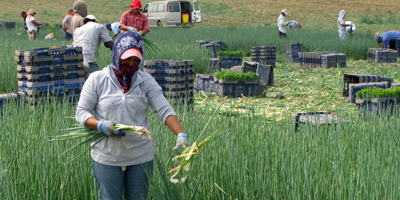
 A juicy local peach, fresh tomato sandwiches, strawberries warm from the field — mmmm, the joys of the summer season.
A juicy local peach, fresh tomato sandwiches, strawberries warm from the field — mmmm, the joys of the summer season.
While everyone has their favorite summer food, few people are aware of the migrant system that brings it to us.
The Sisters of Charity Foundation of South Carolina wants to change that. They spent over a year visiting about eight farms in the state, talking to the migrant workers about their jobs and their lives.
Stephanie Cooper-Lewter, researcher, said the goal of the project and subsequent research brief, which was recently released, is to raise awareness and compassion for these workers, and to let the average person know how to help.
In her time in the fields, Cooper- Lewter said what struck her most was the migrant workers invisibleness because they live and work in rural areas, suffer language barriers, move place to place, and face growing anti-immigrant sentiments.
Yet without them, crops would rot in the field, she said.
Cooper-Lewter said the idea that migrants take American jobs is the No. 1 myth she would like to dispel.
 In testimony from 2013, South Carolina farmer Chalmers R. Carr III, president of Titan Farms and USA FARMERS, reported this:
In testimony from 2013, South Carolina farmer Chalmers R. Carr III, president of Titan Farms and USA FARMERS, reported this:
• out of 2,000 job opportunities, only 25 percent of applicants were American
• of that 25 percent, 89 percent who accepted the job never reported for work or quit
• in all, only 31 Americans worked the entire season
“Really, people don’t want this type of work in general,” Cooper-Lewter said, noting that it’s back-breaking labor, 12 to 14 hours a day in broiling 90-plus degree temperatures.
Maintaining an adequate workforce is just one of the constraints faced by farmers.
Melinda Wiggins, executive director with Student Action with Farmworkers, which helped conduct the research, said improving the system is a complex issue that requires delicate balance.
 In the course of their research, the team highlighted five areas where change is needed:
In the course of their research, the team highlighted five areas where change is needed:
A broken labor system. Because growers cannot depend on a domestic workforce to manage their farms, they must rely on immigrant workers to keep their farms operating. Crops picked by migrants include peaches, strawberries, blackberries, grapes, tomatoes, peppers, watermelon, corn, onions, collards, kale, turnips and more.
Dangerous conditions. Workers often toil dawn to dusk in heat and high humidity, with inadequate breaks and water supplies. They endure constant bending and picking, pesticides and sharp equipment.
Poverty-level wages. Most have incomes at or below the federal poverty level, making farm work one of the lowest paid jobs in the nation. Sometimes, salary is based on productivity. For example, some workers must harvest two tons — 4,000 pounds — of sweet potatoes to earn $50.
“Paradoxically, the very farmworkers who work each day to ensure the plates of others are filled may find themselves without enough resources to feed their families,” Cooper-Lewter said.
Substandard housing. Wiggins, with Student Action with Farmworkers, said housing is usually the worst area, noting that they have found migrants housed in gutted out buses, locked into camps at night, and husbands separated from their wives and children.
“It’s a symbol for me of the entire situation — a very visible symbol of the poverty,” she said.
Accessing schooling. Due to constant moving, migrant children often attend several schools in one academic year, which leads to incomplete education.
Wiggins, who started with the organization about 20 years ago as an intern, said in some ways, the situation has improved, with greater awareness and interest that has grown from the “eat local” food movement.
South Carolina has areas of concern, though. The state’s population is small, with 15,000 to 30,000 migrant workers, compared to 150,000 in North Carolina. Cooper-Lewter said this means the infrastructure is less stable; the workers and social organizations meant to help them are less connected.
Migrant workers are also suffering a backlash, with anti-immigration laws and attitudes of hostility, researchers said.
“I just want people to know that they want the same things that we do in life — to care for ourselves and the people we love,” Cooper-Lewter said. “My hope is that [knowing] would open hearts a little bit in terms of understanding and reaching out a little more.”
The brief concludes with concrete steps individuals can take to stand in solidarity and support the farmworker movement, encouraging people to:
• Eat organic, which reduces farmworkers’ exposure to pesticides and unhealthy chemicals.
• Support farmers who employ humane working and living conditions.
• Spread awareness about farmworker issues, such as improved wages and working conditions.
• Support the Children’s Act for Reasonable Employment, which prevents children from working in harsh conditions.
• Volunteer with organizations that help farmworkers and their families.
Read more about Catholics like you by subscribing to The Catholic Miscellany
